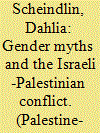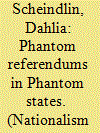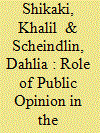| Srl | Item |
| 1 |
ID:
145761


|
|
|
|
|
| Summary/Abstract |
After years of wishful thinking and failed efforts at Israeli–Palestinian peacemaking, the Obama administration has now finally acknowledged what most observers have been saying for some time—there is no chance of a two-state solution to the conflict, at least in the next couple of years.1 Many now question whether such a solution will ever be possible. Although diplomats and experts have long regarded a two-state solution as the best way to resolve this most intractable conflict—and for the last two decades, a majority of Israelis and Palestinians have agreed with this—this conventional wisdom is now seriously in doubt.
|
|
|
|
|
|
|
|
|
|
|
|
|
|
|
|
| 2 |
ID:
130505


|
|
|
|
|
| Publication |
2011.
|
| Summary/Abstract |
Israeli society has distinct and complex gender roles, and the identities of both men and women are largely derived from militaristic socialization and a wartime mentality. Yet these has not been extensive systemic research comparing the attitudes of men and women toward the Israel-Palestine Conflicts.
|
|
|
|
|
|
|
|
|
|
|
|
|
|
|
|
| 3 |
ID:
111576


|
|
|
|
|
| Publication |
2012.
|
| Summary/Abstract |
This study examines the widespread use of referendums in entities that have declared statehood unilaterally but are not generally recognized or accepted as sovereign entities. Referendums in this situation pose a problem: to the voters, they are sufficiently a meaningful political process to warrant participation. Yet, to outsiders-including actors who may have large influence over whether the referendum's political goal can be implemented-the entire process may be meaningless. This article argues that the referendum process is not meaningless but symbolic: It fills the space between actual and desired political reality for the entities who vote. Drawing on referendum experiences in seven phantom states, the research shows that the referendums play a critical role in articulating political intentions, staking out a self-determination or sovereignty claim, displaying democratic legitimacy and forging international divisions and coalitions. Even not holding a referendum has a symbolic meaning regarding the political goals of an incomplete entity. I argue that not only can referendums signal these meanings but they can contribute to making political goals increasingly real.
|
|
|
|
|
|
|
|
|
|
|
|
|
|
|
|
| 4 |
ID:
165825


|
|
|
|
|
| Summary/Abstract |
While the most critical factor that leads to decline in support for a two-state agreement is the perceived lack of feasibility, surveys show that certain incentives can help increase support for a plan among both Palestinians and Israeli Jews.
|
|
|
|
|
|
|
|
|
|
|
|
|
|
|
|